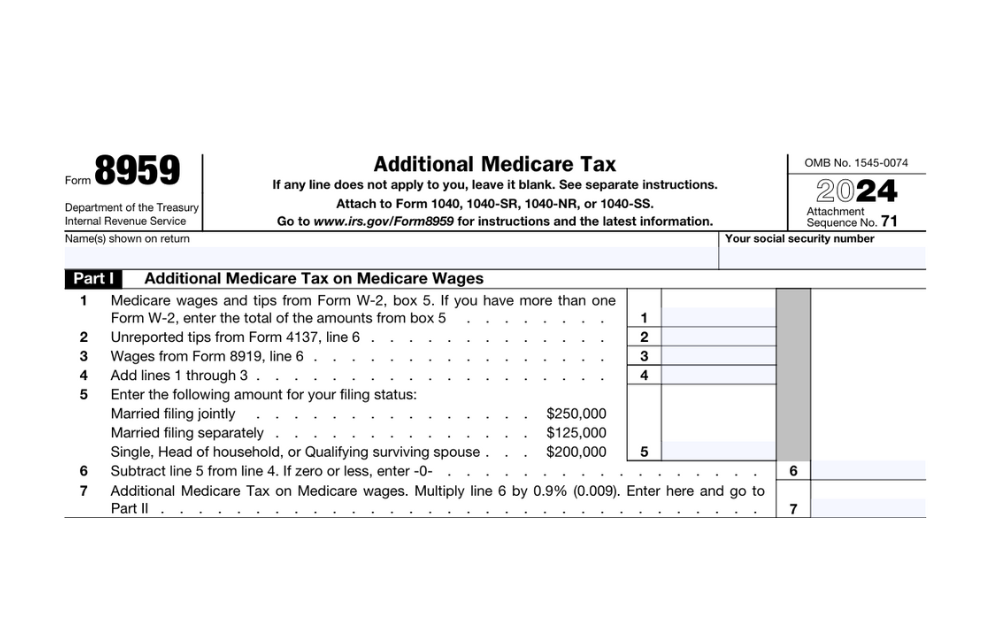Form 8959: Additional Medicare Tax for US Expats

- What Is Form 8959 and Why Do Expats Need It?
- Who Must File Form 8959?
- Special Considerations for Expats
- Why Do High Earners Pay Additional Medicare Tax?
- How Do You Calculate Additional Medicare Tax?
- How Does Form 8959 Work?
- What Are Common Expat Scenarios?
- What Mistakes Should Expats Avoid?
- When Are Filing Deadlines for Form 8959?
- When Can You Get a Refund?
- How Can Expats Get Peace of Mind with Complex Situations?
Only about 3% of American taxpayers owe Additional Medicare Tax, but if you’re a high-earning expat, Form 8959 might be on your radar. The good news? This 0.9% tax only applies to income above specific thresholds, and most expats who owe it find the amount manageable.
Form 8959 calculates Additional Medicare Tax on wages, self-employment income, and railroad retirement compensation that exceed $200,000 for single filers or $250,000 for married couples filing jointly. For American expats, there’s an important catch: the Foreign Earned Income Exclusion doesn’t exempt you from Additional Medicare Tax calculations.
If your income crosses these thresholds, you’ll use Form 8959 to reconcile what you owe against what your employer already withheld. The process is straightforward once you know the rules.
What Is Form 8959 and Why Do Expats Need It?
Form 8959 is the IRS form used to calculate Additional Medicare Tax, a 0.9% tax introduced in 2013 as part of the Affordable Care Act. This tax applies to Medicare wages, self-employment income, and railroad retirement compensation that exceed threshold amounts based on filing status.
The form serves two main purposes:
- Calculate how much Additional Medicare Tax you owe
- Reconcile what you owe against what employers already withheld from your paychecks
This is separate from the regular 1.45% Medicare tax that everyone pays (it doesn’t require a separate form to “fill out”—it’s handled differently depending on your employment status). The Additional Medicare Tax adds an extra 0.9% to the regular Medicare tax for high earners.
Who Must File Form 8959?
You must file Form 8959 if any of these situations apply to you:
For W-2 Employees:
- Medicare wages and tips on any single W-2 exceed $200,000
- Your total Medicare wages plus self-employment income exceed the threshold for your filing status
For Self-Employed Expats:
- Your combined wages and self-employment income exceed the threshold amounts
Income Thresholds for 2025:
- Single or Head of Household: $200,000
- Married Filing Jointly: $250,000
- Married Filing Separately: $125,000
These threshold amounts are not adjusted for inflation and remain at $200,000 for singles, $250,000 for joint filers, and $125,000 for married persons filing separately.
Special Considerations for Expats
For US citizens living abroad, two key points matter:
- No Special Exemptions: There are no special rules for US citizens living abroad for purposes of this provision. You follow the same rules as domestic taxpayers.
- FEIE Doesn’t Help: The Foreign Earned Income Exclusion that can exclude up to $130,000 (2025) from income tax doesn’t apply to Additional Medicare Tax calculations. All your foreign-earned income counts toward the thresholds.
Get the Free Download That Makes Filing Taxes Simple
"*" indicates required fields

Why Do High Earners Pay Additional Medicare Tax?
This additional tax helps fund the Affordable Care Act tax provisions, including the premium tax credit. Congress introduced it in 2013 to generate revenue for healthcare initiatives and ensure higher earners contribute more to Medicare funding.
The tax targets high-income individuals because they’re more likely to have additional resources and typically use more healthcare services. It’s part of a broader effort to make the tax system more progressive.
How Do You Calculate Additional Medicare Tax?
Basic Formula:
- Determine your threshold amount based on your filing status
- Subtract the threshold from your total Medicare wages and self-employment income
- Multiply the excess by 0.9%
Single Filer Example:
- Annual salary: $250,000
- Threshold: $200,000
- Additional Medicare Tax: $50,000 × 0.9% = $450
Self-Employed Expats:
Pay 3.8% total on income above thresholds (2.9% regular Medicare + 0.9% additional)
Example:
Self-employed expat earning $220,000
- Regular Medicare tax: $6,380
- Additional Medicare tax: $180
- Total Medicare taxes: $6,560
How Does Form 8959 Work?
Form 8959 has five parts. You only complete sections that apply to your situation:
- Part I: Additional Medicare Tax on Medicare Wages (for W-2 employees)
- Part II: Additional Medicare Tax on Self-Employment Income
- Part III: Railroad Retirement Compensation (rarely applies to expats)
- Part IV: Total Additional Medicare Tax calculation
- Part V: Withholding Reconciliation (determines if you owe more or get a refund)

What Are Common Expat Scenarios?
High-Earning Corporate Expat: Sarah in Singapore earning $280,000 pays Additional Medicare Tax on $80,000 excess income = $720.
Mixed Income Entrepreneur: Mark in Germany with $150,000 W-2 wages + $100,000 self-employment income exceeds the $200,000 threshold, owing $450 on the $50,000 excess.
Married Couple Abroad: John and Lisa in Dubai with combined income of $270,000 exceed the $250,000 married filing jointly threshold, owing $180 on the $20,000 excess.
What Mistakes Should Expats Avoid?
- Don’t assume FEIE exempts you: The Foreign Earned Income Exclusion doesn’t protect you from Additional Medicare Tax. All foreign income counts toward thresholds.
- Multiple employers: Each employer withholds at $200,000, potentially causing overwithholding you can recover.
- Self-employment income: Combine all Medicare wages and self-employment income when determining thresholds.
- Filing status: Married filing separately has a lower $125,000 threshold.
When Are Filing Deadlines for Form 8959?
Form 8959 attaches to your regular Form 1040. For expats, remember:
- Automatic extension: June 15 for US citizens abroad
- Final deadline: October 15 (with extension)
- Estimated payments: Due quarterly if you expect to owe
An employer is required to begin withholding Additional Medicare tax in the pay period in which it pays wages in excess of $200,000 to an employee and continue to withhold it each pay period until the end of the calendar year.
When Can You Get a Refund?
You could receive a refund of Additional Medicare Tax if:
- You’re married filing jointly but employers withheld based on individual earnings
- You had multiple employers who each withheld when you exceeded $200,000 with that employer
- Your filing status threshold is higher than the $200,000 withholding threshold
How Can Expats Get Peace of Mind with Complex Situations?
Additional Medicare Tax calculations can get complicated, especially for expats with multiple income sources, business ownership, or unique employment arrangements abroad. The interplay between US tax obligations and foreign employment situations requires careful attention to detail.
Whether you’re a high-earning corporate expat, an entrepreneur with complex income streams, or someone caught off guard by the Additional Medicare Tax, our team ensures your return is prepared correctly and filed on time.
If you’re behind on filing and need to catch up, the Streamlined Filing Procedures can help you get current with minimal penalties.
If you’re ready to be matched with a Greenback accountant, click the get started button below. For general questions on expat taxes or working with Greenback, contact our Customer Champions.
This article is for informational purposes only and does not constitute legal or tax advice. Tax situations can vary significantly, and you should consult with a qualified tax professional regarding your specific circumstances. All dollar amounts, penalties, thresholds, and deadlines have been verified against current IRS sources as of July 2025.



